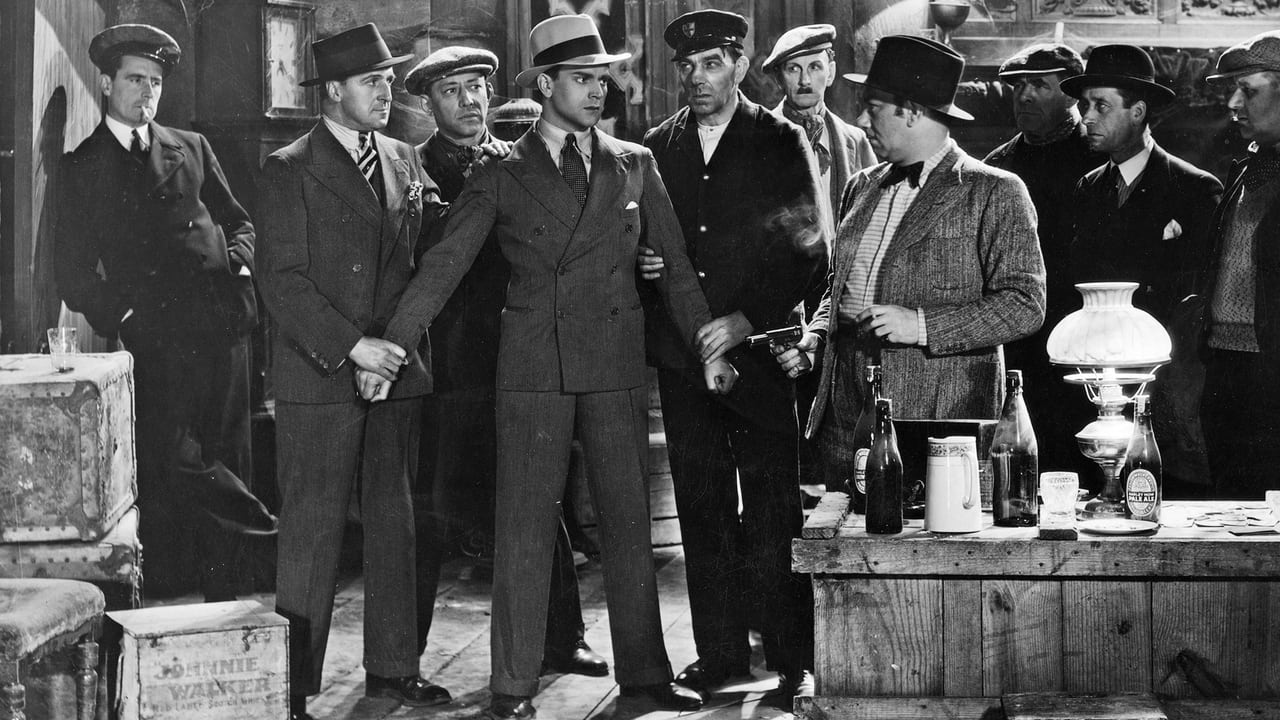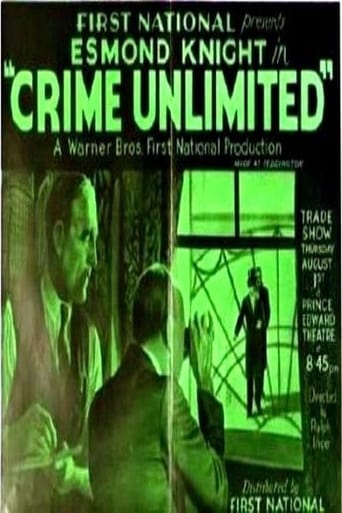

Too many fans seem to be blown away
... View MoreA Masterpiece!
... View MoreIt is interesting even when nothing much happens, which is for most of its 3-hour running time. Read full review
... View MoreExactly the movie you think it is, but not the movie you want it to be.
... View MoreThough "Crime Unlimited" has quite a different "feel" from what a Warners U.S. production on the same plot premise would have the American version would have moved a lot faster and would have had wall-to-wall background music (this one doesn't have an underscore at all!) it's quite a good movie and makes one wish more of the Teddington productions existed. (About 100 were made while Warners owned the studio but only about one-third of them survive and among the lost is the one most everyone would most want to see: "Murder at Monte Carlo," Errol Flynn's first starring role and the film that convinced Jack Warner that Flynn belonged in Hollywood.) Its debt to the Holmes-Moriarty story and especially to Fritz Lang's Dr. Mabuse films is pretty evident the villain is a man who, to preserve his incognito, meets his confederates in a secret room and communicates with them only by intercom but it's well plotted, the denouement makes sense and Esmond Knight is a personable hero, handsome but also quite a good actor who effectively projects the character's combination of courage and naïveté. But the film belongs to Lilli Palmer, whose performance would jump out at you even if you didn't know she would become a star later on; playing the most conflicted character in the story, she makes her rich and complex and brings her dilemmas home. Ralph Ince's direction could have used more of a sense of atmosphere (though it was clear from some of the setups in the villain's headquarters that he'd screened Lang's Mabuse films), and there are a few points where the pace slackened and the film seemed dull, but overall "Crime Unlimited" is quite a good piece of work and the British audiences who saw it in 1935 were probably entertained even while waiting for the big Warners Hollywood production they'd actually paid to see.
... View MoreThe situation was this. In 1927 (according to Robert Osborne in introducing this and two other films on TCM) a British law insisted that British casts and crews had to be used in films shown in the U.K. by foreign distributors. Warner Brothers - First National got around this by doing films at a British studio they bought at Teddington - so that they would show one of the British films with one of their American films on the same bill. This proved to be acceptable, and they would turn out about 100 films in the 1930s and 1940s, before the studio was closed due to bomb damage from a V-2 rocket. Later it was repaired, but the law was changed and Warners sold Teddington to British interest. It still is in use.Only a third of the Warners Teddington films survive, and Turner Classics showed three last Monday, and three a week before - all shown the first time in the U.S. The first shown on Monday was CRIME UNLIMITED. This melodrama fits nicely into it's London locale, as it deals with a phenomenally successful jewelry gang under one "Merrick" that keeps beating Scotland Yard's attempts to stop it. When they kill an undercover cop (they've also killed three stool pigeons), the Yard knows it must crack the case to regain public trust in it's abilities. The dead detective held onto a clue that mentions "A D 1935 +" on it. Hopefully this taunting clue can be cracked. The Assistant Commissioner (Cecil Parker) decides on another risky scheme. Again, plant a police inspector to spy and uncover the gang inside the gang. But to do this, the police inspector must appear to be a really clever jewel thief - one that "Merrick" would consider for his gang. Shortly afterward we see Esmond Knight as Pete Borden, pulling off a clever jewelry snatch of three expensive bracelets worth 3,000 pounds. He manages to go to a gambling den to try to fence the jewels. There he meets one Natasha (Lili Palmer), who is one of the members of "Merrick"'s gang. He is taken (blindfolded) to Merrick's headquarters, and speaks to him over an intercom. Given little option (join or be killed), he joins the gang.From that point on he acts totally as a member of the gang, but their well organized heists keep going awry. "Merrick" is increasingly suspicious of Borden, as all the mistakes occurred after he joined. The climax is when Borden and Natasha steal a famous necklace at a society party, although Borden's alias is revealed to be false. He escapes. But although Natasha gets a piece of jewelry, it turns out to be a paste imitation. At which point "Merrick" decides Borden (and possibly Natasha) are expendable.It's actually not a bad little mystery, as we keep wondering who is "Merrick", and as we see each of Borden's leads passed to the police get stymied by this criminal genius and his gang. If the conclusion seems a trifle melodramatic (the actor who is Merrick seems too giggly when uncovered - the role called for Henry Daniell if possible for perfect affect). Knight is a feisty little actor (with sufficient English restraint, believe it or not). As for Lili Palmer, Natasha was a good early role as a bad girl who reforms in time. But she did go on to better things - and for awhile so did Knight.
... View MoreThis film is a mystery which concerns a rather sick man who loves to play chess and laughs like a Bela Lugosi who loves to cause all kinds of problems and is being investigated by Pete Borden, (Esmond Knight) as an undercover police man and gets deeply involved with Natasha, (Lilli Palmer) who made her first film debut and adds a great deal of charm to this rather old B picture from England and produced by First National Pictures. If you are interested what woman's hairs styles looked like and the clothes that they wore, this is a great film to enjoy along with the old automobiles that were driven during the Year 1935. Lilli Palmer was so well liked, she eventually came to the United States and married Rex Harrison and the both of them had a great career together.
... View MoreIt zips along quickly, like most B productions, with little wasted motion and no time spent on incidental events or reality intrusions. It's a British crime thriller starring Esmond Knight and Lilli Palmer and was made in 1935, about the time Hitchcock was hitting his stride in the same arena.You can't help wondering, as this thing rolls along in its complicated but uninspired way, like any cheap second feature starring Boston Blackie or Charlie Chan, what Hitchcock would have done with it. There's even a scene shot in an illegal casino in which one of the villains is eating a meal. And that's it. He just eats. All the scenes show about as much interest on the part of the participants as this one, as exciting as watching a barnacle clinging to a rock.Lilli Palmer plays a slightly tarnished moll who falls for the hero and turns good. She's recognizable to those familiar with her later films only because her voice is the same. It's really strange. She was 21 when this was released and quite pretty. Ten or fifteen years later she was beautiful. Did she get a nose job, or what? Unless you have a taste for old-fashioned crime films with the undercover Scotland Yard agent finally trapping the cackling villain -- "Of course, you think I'm mad. I prefer to call it genius." -- you might better think about spending your time doing something other than this absolutely formulaic B film.
... View More